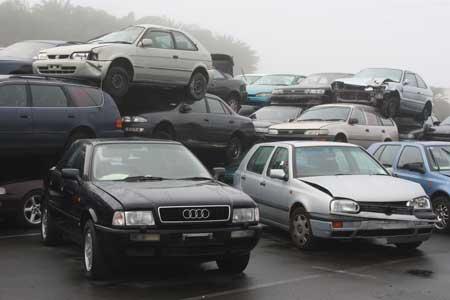|
With the ever increasing age of the New Zealand car park the need for affordable parts and panels remains as great as ever, hence the dismantling industry is gearing up to meet the economic and environmental challenges ahead of it. MEN editor Robert Barry looks into the current state of the market and asks some of the stakeholders where the industry is heading. Twenty three years ago when the Japanese used car import industry was founded, many second hand dealers found themselves with vehicles that the local distributors would not support with new or second hand parts. Strong Group director Warren Strong says that when he was approached by some of the import dealers in 1987 he promised them he would do whatever he could to support their vehicles. “The whole market changed overnight – we swept a whole group of customers away from buying new to buying second hand recycled parts because being a specialist brand supplier we could support their imported vehicles with parts and panels when the local franchises were unable to,” says Warren. “This was a sea change that lasted until 1990 when it became clear that used Japanese imports were going to stay and local distributors realised the error of their mindset and that they were missing out on a valuable revenue stream,” he says. The sharp reduction in the amount of used vehicles imported to New Zealand over the last eighteen months has resulted in the car park aging and a swing amongst motorists of older vehicles from replacing their vehicle to repairing it. “Some repairers still prefer not to use second hand or recycled parts because they feel that fitting a new part is in their and the customers best interest, but often that is not an economic solution for the customer or the age of the car. “This is another mindset that also needs to change, and repairers also need to work with suppliers on establishing closer relationships with and settling more realistic margins on second hand parts. “We don’t mind discounting the parts as best we can to help a workshop win a job, but workshops also need to consider discounting their rates for labour and sundries where it’s appropriate to retain the customers business. “Naturally we’ll still price the parts to make a margin but if a repairer adds an excessive margin, that’s unfair,” says Warren. “We come across this often when the customer comes directly to us looking for an alternative quote. “Quite often customers with older vehicles needing parts and repairs will find themselves driven out of the marketplace by the costs quoted – so they turn to the secondary market which often has less than ethical business practise and offers no warranty or come back should the repair fail or not be satisfactory. “The repair industry is giving these rogues the opportunity to trade by pricing themselves out of the market in an economy where people have less discretionary income and there is tighter credit which does not allow them to upgrade their vehicle as they may have done previously. “At Strong Group our position in the market is now quite substantial, and we offer the repairers a warranty on the parts and the labour involved in fitting it to the vehicle. “We will always honour that warranty to the repairer if the part fails and sometimes they do fail more than once, but because of our size we will have more stock of that part sitting in our inventory and we’ll keep fixing it until the repairer and customer is satisfied.” The cost of doing business for the dismantling industry such as meeting the stringent requirements by local bodies for environmental compliance in pollution control in addition to the normal overheads of running a business means that unfortunately increased costs are also passed onto the consumer. Warren however sees this as a benefit to the industry that a level playing field is created for all dismantlers and associated industries. “We’ve supported local government in their efforts to protect ethical best practise and environmental protection. Strong Group has invested heavily in the latest oil catchment technology to ensure that no pollution reaches the water table from our operations.” |
The dismantling industry has also seen a sea change during the recessional turbulence with the advent of new business models such as the Parts Trader system implemented by insurer IAG impacting directly on industry profitability. “Its inevitable that margin on parts and panels will be driven down when a third party is controlling a growing percentage of your business,” says Harry Dodson the chairman of the Automotive Parts Industry Association (APIA) which represents the interests of dismantlers, automotive parts importers and the aftermarket suppliers. “The Parts Trader business has grown exponentially – which has seen the loss of a relationship between parts suppliers and customers,” says Harry. “There are some panel shops that still come direct to us but for any that are quoting for IAG work or insurance work for other companies in the long-term, this is the way forward.” “Personally for me it is not a negative as the panel business has moved from one client to another – but the control factor of a business by a third party is a concern. Demand from international markets competing with New Zealand parts importers are also impacting upon the price and availability of parts and panels according to Harry. “Every second hand Japanese car that is imported is a potential customer for recycled parts regardless of who fixes it. “However, New Zealand new vehicles generally don’t fall into our customer base until they are seven to ten years old – the franchise dealers have done a very good job of keeping new vehicle customers in their OEM stream for longer periods. “The make up of the local car park is also changing and with global models such as the Suzuki Swift, Honda Stream and Nissan Cube being imported second hand and sold locally. The variations of models available are shrinking and that’s had a slow but direct effect on the availability of recycled parts. “For these models and other popular models, the New Zealand parts importers are now competing with other export markets countries for stock of parts and damaged vehicles, so that also pushes up the cost to the end user.” he says. Harry also agrees that the mechanical trade needs to restrain its margin on recycled parts to keep the customers business. “People don’t usually buy small second hand items, they buy larger items such as alternators, cylinder heads, even complete engines and these need to be kept within the bounds of affordability or customers will be driven elsewhere,” he says. |






